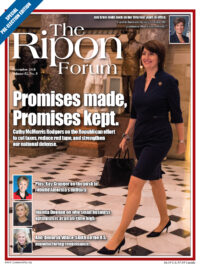
For the past 23 months, small businesses have shown a streak of optimism never seen before. With small businesses employing nearly half the nation’s workforce and accounting for almost half of the GDP, when small businesses do well, it boosts the entire economy.
When I travel around the country to meet with NFIB members, I hear “business is booming” from almost everyone. Business is so good that they can’t find enough workers to keep up with the demand. The statistics back up the anecdotes.
For 45 years, NFIB has taken the pulse of the small business economy by surveying small business owners about their business operations. The survey is called the Small Business Economic Trends (SBET) report, or Optimism Index. In August, the NFIB Optimism Index soared to a record high of 108.8, breaking the 1983 record of 108 under President Reagan.
In August, the NFIB Optimism Index soared to a record high of 108.8, breaking the 1983 record of 108 under President Reagan.
The NFIB Optimism Index is made up of ten questions – half are about business owners’ expectations in the next three-six months; the other half are about actual business activity. The Optimism Index has long been a leading economic indicator because when owners report high expectations for the economy, about six months later they spend money to invest and grow their businesses, creating growth. In 2017, NFIB members reported high expectations. In 2018, they invested in real business activity based on those expectations, and the result is four percent growth in GDP.
The Optimism all-time record set in August was dominated by real business activity. This year has produced 45-year record high measures of job openings, hiring plans, actual compensation increases, and profit growth. Capital spending plans and inventory investment plans both hit levels not seen in a decade.
Optimism among small business owners is good for all Americans. A recent NFIB survey, conducted by Morning Consult, found that more than seven in ten Americans purchase goods and services from small businesses often. Small and independent businesses make up more than 99 percent of all U.S. businesses and their plans to grow and increase compensation affect all our communities.
Business is, indeed, booming on Main Street, and Congress has an important role in helping sustain this historic growth. For years, our members have cited taxes as a top concern. The 20 percent small business pass-through deduction, created in the Tax Cuts and Jobs Act passed last year, finally gave small businesses tax relief that was long overdue. But the small business deduction expires in ten years, while the corporate tax cut is permanent. It is crucial that Congress make the small business deduction permanent so that small business owners can be certain and make the right decisions so that they can hire, increase wages, and grow their businesses.
That’s why this midterm election is so important — there is more work to be done. Pro-small business control of Congress is on the line in November. In addition to prominent issues like making the small business pass-through deduction permanent, many crucial issues are on the ballot in statehouses across the country that determine whether small businesses succeed or fail.
This year has produced 45-year record high measures of job openings, hiring plans, actual compensation increases, and profit growth.
Fortunately, small business owners are active and they’re not willing to cede the ground we’ve gained in the last two year. At NFIB, we make sure that our members know exactly how their elected officials voted. Consider that a small business owner may have family, employees with families, and hundreds of thousands of customers, and it isn’t hard to see how Small Business Voters can make the difference in an election.
In 2016, 264 NFIB endorsed candidates were elected to Congress. This cycle, we’ve endorsed 274 candidates for Congress. When NFIB-endorsed candidates, which include many small business owners, are elected to office, they have a proven record of supporting and passing policies that contribute to a robust small business economy.
The state of small business is the strongest in a half century, but to sustain this level of success we must be proactive both legislatively and politically. The next Congress could determine whether the small business pass-through deduction is made permanent or if it is repealed, the next Supreme Court nominee makes it through the Senate, or small business owners receive healthcare cost relief. It is imperative that all who care about the future of small business turn out to vote and hold elected officials accountable for how they vote.
Juanita D. Duggan is the President & CEO of NFIB. NFIB is the voice of small business, advocating on behalf of America’s small and independent business owners, both in Washington, D.C., and in all 50 state capitals. NFIB is nonprofit, nonpartisan, and member-driven. Since their founding in 1943, NFIB has been exclusively dedicated to small and independent businesses, and remains so today.




